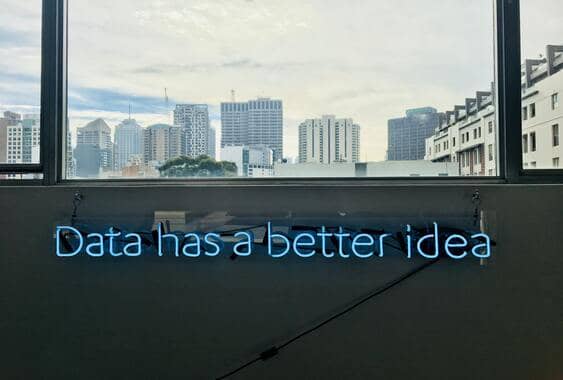People like to talk about the differences between “artistic” types and “maths and science” types, but anyone working in front-end developer jobs can tell you this is a false dichotomy. A front-end developer is responsible for the user interface of a website, so they certainly deal with math and science. However, it’s an intensely creative position that’s artistically fulling to those who choose this career path.
So, what makes front-end developer jobs so creative, and how does the role differ from a full-stack developer? In this guide, we’ll answer these questions and provide an overview of the best education pathways for front-end developer jobs. We’ll cover salary prospects and job growth for these exciting tech careers and even share top companies offering front-end development roles.
What is Front-End Development
In layman’s terms, front end development is the process of designing and building what users see and interact with. This includes the graphics, the user interface, and interactive elements such as buttons or banners that allow users to trigger actions. Front end development is often referred to as UI (user interface) design.
Technically speaking, front end development is the process of using HTML, CSS and JavaScript to create web pages and applications that can be seen on a browser. This area of web development primarily focuses on designing and coding interactive websites, as well as developing graphical user interfaces (GUIs). The growth in technology means that front-end development also includes the design of mobile apps.
Why Become a Front-End Developer?

High Demand
Front-end development is needed for every website you visit and every app you download. From the smallest start-up to agencies providing web services to businesses to tech giants like Google and Amazon, every company with a digital presence needs talented front-end development professionals. As a result, demand remains extremely high for this career path (see job growth statistics below).
Tech Careers for Creative Individuals
This role involves designing and optimizing the interface that tech product users interact with. This means you need a keen eye for aesthetics and an ability to create a functional, coordinated web design.
Tech careers like this require you to blend problem-solving skills with an artistic mentality. Your projects must deliver the best experience for users while achieving your client’s conversion goals.
If you’re a creative person looking for exciting careers in tech, front-end developer jobs are a natural choice.
Excellent Salary & Outlook
The BLS doesn’t provide specific data for this role jobs but reports that the median salary for web developers and digital designers is around $77,000 per year. By contrast, salary.com suggests that the median annual salary for a front-end developer in the U.S. is around $119,000. While estimates may vary substantially, we can conclude that these tech careers are generously compensated.
The BLS also projects job growth of 8% from 2019 through 2029 for generalized professions in this area. This is far higher than the national average (3-4%), but the true rate could be significantly higher than this for front-end developer jobs, given that the role will remain central to the success of any tech firm.
Front End vs. Back End vs. Full Stack Web Development — What’s the Difference?
So, what separates front end vs. back end and full stack development? The main differences between these career paths are that:
- Back-end developers work with the server and the database to ensure that the website is functioning properly
- Front-end development involves writing code that optimizes the user’s experience of the website
- A full-stack developer works between the 2 fields to ensure proper integration
Think of it like this: back-end roles involve ensuring that a car’s engine and gearbox will work properly on the road. Front-end developers make sure that the steering wheel, the brakes, the gearstick, and all the other user-controlled aspects work in a way that creates the best experience for the user. A full-stack developer works between these areas and checks that they’re interacting properly.

Steps to Become a Front-End Developer
Embarking on the journey to become a front-end developer involves several crucial steps. First, acquiring the necessary education is essential. Formal education options include pursuing a computer science or related degree, attending coding bootcamps, or completing online courses and certifications. These options provide a solid foundation in the fundamentals of web development and programming. However, self-learning and practice are equally important, as they allow you to hone your skills and stay updated with the latest industry trends.
Next, building a strong portfolio is critical for showcasing your skills and projects to potential employers. Your portfolio should include examples of your work that demonstrate your proficiency in HTML, CSS, and JavaScript, as well as any additional tools and frameworks you have mastered. To create an impressive portfolio, focus on including a diverse range of projects and provide clear explanations of your role and the technologies used in each case.
Networking and gaining experience are also essential steps in becoming a front-end developer. Attend industry events and conferences to connect with professionals in your field, and join online communities and forums to share knowledge and resources. Participating in internships and freelance work can provide valuable hands-on experience and further expand your network.
Finally, prepare for your job search and interviews. Develop a targeted job search strategy and make use of online job boards, social media, and industry-specific platforms. When preparing for interviews, ensure that you are ready to tackle both technical and behavioral questions, and practice your problem-solving skills using coding challenges and mock interviews.
Education Pathways to Become a Front-End Developer
Many professional roles will require you to have at least a bachelor’s degree, and at the higher level, some specify a master’s degree in their requirements.
However, there are many education pathways to successful tech careers in this field. Top organizations understand that industry experience and a proven track record of creativity and success are just as important as a degree.
Bachelor’s Degree
A bachelor’s degree in computer science or software engineering is considered the natural education pathway for front-end developer jobs. This will give you strong technical acumen as well as specialized knowledge of the role. It will also equip you with a better understanding of other roles, such as how full-stack developer jobs work.
Other bachelor’s degrees that provide a good grounding for these tech careers include mathematics, other engineering degrees, or web design.
Master’s Degree
Some colleges offer master’s degrees in this field. Taking this qualification will give you a strong competitive edge over other candidates if you’re applying to one of the big tech firms.
However, master’s degrees in other software specializations will also be advantageous and may equip you with a wider skillset. This could lead to progression opportunities in overseeing tech projects, as all-around knowledge is hugely beneficial in senior roles.
Certificate Programs in Front-End Development
Certificate programs in front-end development are an affordable way to get started and discover if these tech careers would interest you. They typically last between 12 weeks and 6 months, although some may last for up to a year.
Many certificate programs are highly regarded by prospective employers and will give you a good understanding of important programming languages like JavaScript and React.
Front-End Developer Bootcamps
Front-end development bootcamps are more intensive than certificate programs, and you’ll benefit from one-to-one tuition. These web development bootcamps often last for around 12 months and are extremely affordable compared to degrees. However, they equip you with the skills you’ll need to succeed in these tech careers and are often strongly geared towards helping you find front-end developer jobs at the end of your studies.
Self-Study
Free self-study programs are widely available online and can provide a great way to learn coding skills in your own time. These are especially useful if you’re working on a tight budget or currently in a full-time job that may not be related to software. These provide an affordable way to learn in your own time and build up to further qualifications if you want to move into these tech careers.

Skills You’ll Need to Become a Front-End Developer
To succeed as a front-end developer, you need a combination of technical and soft skills. Technical skills include proficiency in HTML, CSS, and JavaScript, which are fundamental to building web pages and applications. Additionally, knowledge of responsive web design ensures that your creations are accessible and functional on various devices and screen sizes. Familiarity with front-end development tools and libraries, such as version control systems and CSS preprocessors, will also help you streamline your workflow and collaborate with other developers.
Soft skills are equally crucial in a front-end developer’s toolkit. Problem-solving abilities enable you to find effective solutions to design and coding challenges. Strong communication skills facilitate collaboration with team members, ensuring that everyone is on the same page regarding project goals and requirements. Time management is vital for delivering high-quality work within deadlines, while attention to detail ensures that your projects are polished and free of errors.
Finally, staying updated with industry trends and advancements is essential for maintaining a competitive edge in the ever-evolving world of web development. By keeping an eye on the latest tools, frameworks, and best practices, you will be better equipped to create cutting-edge websites and applications that meet the needs of modern users.
Below are some key skills you’ll learn on your way to becoming a front-end developer.
- Coding skills. You’ll learn to code in various languages, predominantly languages like JavaScript, React, CSS and HTML. You may also wish to learn popular languages like Python and MEAN. A grounding in these languages will help you communicate with full-stack developers on your team.
- Web design. Front-end developer jobs have overlap with UX and UI designer jobs. You’ll need to be skilled at turning code into an attractive user interface. You’ll work closely with designers to create a seamless user experience with a unique interface that reflects your organization’s goals and identity.
- Communication. These tech careers are collaborative. You’ll need to be in constant communication with your team’s full-stack developer and the rest of the team, reporting bugs and learning from each other to streamline the user experience.
Front-End Developer Career Pathways
Below are the general responsibilities for front-end developer jobs at 3 levels of seniority.
Entry-Level
At the entry-level, you’ll work closely with the design team to optimize the user interface. In addition, you’ll work on programming using languages like JavaScript and CSS. Usually a senior team member will oversee your work.
Mid-Level
At the mid-level, you’ll be responsible for overseeing and testing the code that the user interface relies on. Additionally , you’ll develop an understanding of how the front-end and back-end work together and communicate closely with the team to ensure that projects are completed in a timely fashion and to a high level.
Senior-Level
When you progress to a senior position, you’ll take more creative control over how a user interface should look and guide your team towards the best workflow. You’ll work with other departments in your organization and could be in charge of setting budgets and timescales for projects.
Career Advancement Opportunities for Front-End Developers
As a front-end developer, you have several opportunities for career advancement. One way to progress is by learning advanced front-end technologies and frameworks, such as Angular, React, and Vue.js. Mastering these technologies can open up new job opportunities and increase your marketability in the industry.
Another option for career growth is expanding your skill set to full-stack development. By acquiring back-end development skills, such as working with databases and server-side languages like Node.js or Python, you become a versatile developer capable of handling both front-end and back-end tasks. This broadened expertise can lead to higher-paying positions and increased job security.
You may also consider pursuing leadership roles or specialized positions within the field. For example, you could aim for a team lead position, overseeing other developers and coordinating project efforts. Alternatively, you might specialize in UI/UX design or web accessibility, focusing on creating intuitive and inclusive user experiences. These specialized roles allow you to leverage your front-end development skills while also broadening your career possibilities.

What Companies Hire Front-End Developers?
Here we list some of the most exciting tech companies offering front-end developer jobs.
- Google. Google produces a vast array of tech solutions for individuals and businesses. Working in front-end development at Google, you’ll learn from the best in the industry how to use code and rigorously test to ensure the best user experience possible. You could work in many areas, including Android technology or Google’s extensive web services for businesses.
- Facebook. Facebook’s success relies on how usable its services are, and for this reason, it seeks out the best front-end development professionals in the business. In these tech careers at Facebook, you could work with businesses looking to use Facebook ads to optimize their presentation or even work directly on the site’s iconic interface.
- Experian. Experian is a premier provider of tech services with offices around the world. As a front-end development professional at Experian, you’ll help clients optimize their web presences and provide tech solutions for many businesses.
Interview Questions – Examples
- What do you think are the qualities of a great web developer?
- Do you know what a headless CMS is?
- What programming languages do you know and which ones are important in the front-end web development process?
- What do you think is the most important aspect of web development?
- What’s your opinion on responsive design?
- What’s your experience with Sass, Less, and other CSS preprocessors?
- How would you optimize a Sass/LESS stylesheet for performance?
- What are some of the challenges you’ve faced in your past jobs in this position?
For more interview preparation prior to your interview, check out our short front end developer interview question guide, which includes questions and answers.
Conclusion
If you enjoy working in the space between artistry and finding intuitive solutions to problems, tech careers in front-end development could be your ideal job. Plus, this career is always in demand.
Consider the above education pathways to start your career in this exciting field of front-end development today.



